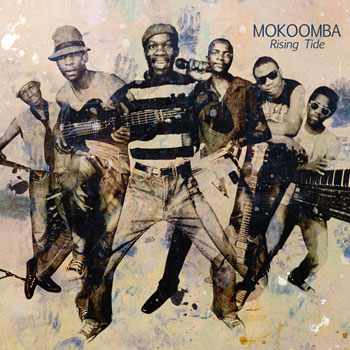Reviews August 6, 2012
Rising Tide
Mokoomba is quite simply the most impressive band Zimbabwe has produced in recent memory. Surprisingly, its members do not hail from the country’s Shona majority—like iconic bandleader/songwriters Thomas Mapfumo and Oliver Mtukudzi—or even the large Ndebele population in the south. Rather, these six musicians come from the tiny Tonga minority. The Tonga lived along the banks of the Zambezi River (bordering Zambia to the north) until most were driven to higher, and dryer, ground by flooding that created Lake Kariba. But Mokoomba, formed in 2001, do not dwell on the Tonga’s tragic past. Instead, they trumpet the energy and dynamism of their region’s best known geographic feature, the august Victoria Falls. That’s the kind of energy and confidence this band wants to project, and on Rising Tide, they succeed mightily.
Lead singer Mathias Muzaza has been all over southern Africa, absorbing music and culture. He speaks 6 languages, and sings with a sharp, clear voice capable of gale force exertions we might expect to hear from a West African griot. Muzaza and guitarist/singer Trustworth Samende wrote most of the 12 songs on the CD, which range from funky rap, to expert Congolese grooves, including quasi-reggae and even a Latin tune along the way. You won’t hear any of the sounds generally associated with Zimbabwe—no mbiras, marimbas, or Ladysmith-style choral work. Although Mokoomba exploit Tonga rhythms and melodies, they are out to create a global fusion, a music rooted in their home reality while still open to the sounds of the world.
After winning awards in Zimbabwe, recording a debut CD and touring Europe in 2009 and ‘10, Mokoomba caught the ear of ace Cote D’Ivoirian bass maestro and producer Manu Gallo. Gallo is a veteran of Kiyi M’Bock, Zap Mama, and has released a number of fantastic solo CDs in her own right. She produced Rising Tide, and her savvy judgment and familiarity with high-end Afropop production help to make every track shimmer.
“Njoka,” the title track, is a brilliant mash-up of beat box vocals, warm guitar riffing, and punchy percussion and brass work, all backing Muzaza’s edgy lead vocal and rich layers of backing vocals from the rest of group. This band can sing, and they prove it on every track. For a taste, check out the video of “Njoka”, which presents an intriguing black-and-white look at downtown Harare after more than a decade of economic decline. “Mwile” is the Latin track, and Muzaza’s keening vocal works beautifully in this context. “Misozi” explores the Congo connection, beginning with folksy acoustic guitar picking reminiscent of the old copperbelt pickers (from the Zambia/Congo border). Later, the song revs into full Congo pop mode, with animated stop time riffs, sweetly soaring guitar leads, and great rhythm breakdowns. “Nimukonda” nods to melodious old-school reggae, and then rough-and-ready dancehall.
The sheer density of ideas in this session is impressive, but it never feels like the musicians are merely checking off stylistic boxes. Their commitment and verve enlivens every performance, right up to the clubby crescendo, “Weleye,” where Gallo’s suave production touch is once again a unmistakable and powerful asset.
This is an A+ international debut from a band nobody saw coming. Reports are they are even better onstage. In all, Mokoomba, riding their own rising tide, are the best news we have heard out of Zimbabwe in years.










